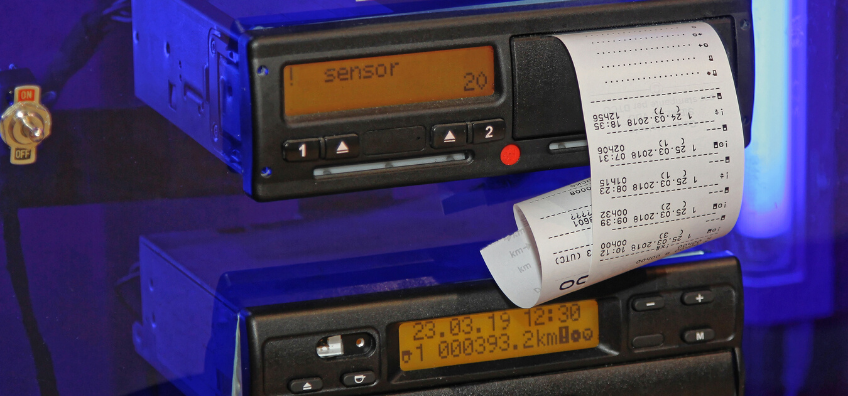What about that Mobility Package?
03/02/2020

What is the Mobility Package? It is a set of regulation changes concerning things like:
- Requirements for the maximum daily and weekly driving time, minimum breaks and daily and weekly rest periods;
- Posting drivers in the road transport sector;
- Practising the profession of road transport operator, as well as access to the international road transport market.
Claims about how this Package being bound to destroy the transport market and our obligation to fight it with all our might – or face annihilation – have been surfacing for quite some time now. Thus, being totally convinced of that, I listened to speeches by eminent persons, both from the political and transport scene, read many articles, and quite frankly, was truly frightened at what the future would bring. Finally, on 11 December 2019, a compromise reached via triangular diplomacy was published. And to my great surprise – the destruction we were promised did not come.
I am neither in favour of the package nor do I intend to defend it. I would like to simply point out that it introduces new rules that all of us have to adapt to. What it does not do, however, is removing Polish carriers from the European market. Let us now look at some of its provisions.
An international driver can take two shortened weekly rest periods in a row (2x24h).
Possiamo organizzare qualsiasi
trasporto in 45 minuti
o meno
Il nostro dipendente preparerà rapidamente una proposta concreta, e dopo averla approvata, si assicurerà personalmente che nulla impedisca la consegna in tempo.
Gli ordini urgenti non ci sorprendono, perché siamo ben preparati.
Of course, there are additional restrictions regarding this, such as the need to compensate for the shortened rest periods with a full weekly rest period at the base or at home in the third week. In practice, however, a driver can start his or her first week of work, take a shortened weekly rest period, work for another week, take a shortened weekly rest period again and only be forced go back to the base for the third week. The 3/1 work system seems to be a perfect fit here. It is hardly a tragedy, as it is perfectly possible to plan and implement a new work system and continue operating.
It is mandatory for drivers to return to their operational centre (base) or place of residence every 4 weeks.
This provision is already starting to create problems, nonetheless, we can start thinking about solutions to minimize its negative effects. For example, we can take advantage of the benefits brought by the provision discussed earlier and plan drivers’ work based on the 3/1 system. Doing so fully resolves this problem. Yet, the situation of people who primarily run cabotage operations will be much more difficult. Opening another company abroad to set up a base that will allow us to comply with this provision is always an option here. Pessimists will most likely outright dismiss this argument, claiming that a plethora of new issues, such as language and cultural barriers and higher costs, makes this impossible. But is this not a chance to expand into new markets as well? Launching such a company and recruiting the staff will not be easy. Yet, there are many specialised companies which can assist with that and the development potential is indeed enormous.
It is possible to interrupt weekly rest periods while aboard a ferry:
- Shortened rest periods (24h) – in all cases;
- Regular rest periods (45h) – provided that additional conditions are met.
Carriers who carry out regular transport services to the UK or Scandinavia need no explanation on just how beneficial ‘moving’ a vehicle during a weekend stay at a ferry terminal can be. This saves a lot of work, such as involving additional drivers to drive the vehicle onto a ferry, and enables trip savings when using cheaper cruises.
Roadside inspections shall cover the last 56 days.
Do you have a magnet installed under your dashboard? Are you actively breaking any laws? Do you have anything to hide? If you answered ‘no’, then what are you afraid of? Minimising the number of dishonest drivers and carriers will surely have an immensely positive impact on the transport market.
Possiamo organizzare qualsiasi
trasporto in 45 minuti
o meno
Il nostro dipendente preparerà rapidamente una proposta concreta, e dopo averla approvata, si assicurerà personalmente che nulla impedisca la consegna in tempo.
Gli ordini urgenti non ci sorprendono, perché siamo ben preparati.
MINIBUSES whose gross vehicle weight (GVW) exceeds 2.5 tonnes and which are used in international cabotage and goods transport:
- Must comply with all rules provided in 561/2006/EC;
- Must have a tachograph installed and enabled;
- In the case of commercial transport – must obtain all the necessary licences and meet the requirements for the occupation of road transport operator;
- Financial collateral requirement – € 1800 for the first vehicle, € 900 for each subsequent one.
Although most minibus drivers will probably consider this controversial, I fully agree with the above provisions and firmly believe that they should have been introduced a long time ago. I know drivers who were being forced by their employers to drive for 20 hours at a time without any rest – because ‘we have to unload’, ‘the goods must arrive on time’, ‘we earn money only when the wheels are turning’. This is the grim reality – our rush to earn money is a cause of enormous risk in daily traffic. According to a report by the Polish Police Headquarters, heavy goods vehicles with GVW over 3.5t caused 878 road accidents, while those with GVW under 3.5t caused 1350 accidents in 2018 alone. Since companies owning a fleet of minibuses with GVW between 2.5 and 3.5 tonnes will be forced to obtain transport licences, such licences may also be taken away should they break the law. This alone should effectively deter them from trying to do so.
Employee posting is the most controversial aspect. Transit and bilateral transport (export from Poland/import to Poland) have been completely excluded from posting, whereas cross-trade and cabotage are fully covered by it. If our vehicles transport goods in a so-called circle, i.e. they both depart from Poland and end their journey there, then the mobility package will facilitate our work by completely removing the obligation to report employees driving them as posted. However, if our operations consist primarily of transporting goods between different countries without returning to Poland, then the situation is much more difficult. In such a case, we are obliged to report our drivers as posted employees. While it is true that reporting procedures are to be simplified (no need for a representative, electronic documentation in English only), we will still be obliged to provide our employees with all collective agreement allowances and will be completely unable to include diets and lump sums in the minimum wage amount. The costs of maintaining such employees will increase significantly. Even though these changes are not favourable for carriers, we will still have 18 months from the day on which the Mobility Package is published to thoroughly prepare for their introduction.
The Mobility Package provides us with both interesting opportunities and numerous restrictions and impediments to overcome. In my opinion, however, in no way did it bring about the Armageddon that we were promised. We still have some time before all of the Package’s provisions come into force as well. Let us not waste it on complaining, but rather use it to find effective solutions. After all, we Poles have shown our resourcefulness countless times already.


